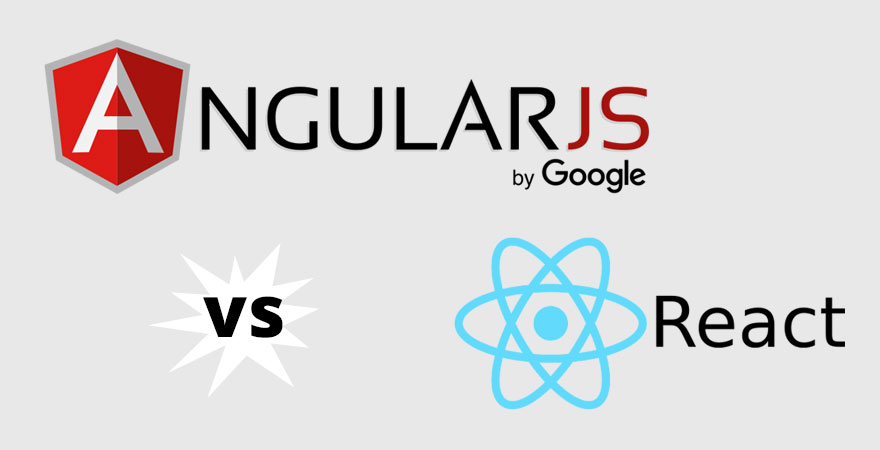
As we are growing, technologies are changing and things are becoming modern yet troublesome. This proves certainly true for the web development arena where the professionals need fresh ideas for each new project. Businesses are also thinking of the new ways of promotion of their business.
Mobile apps are the trendiest feature here that each brand demands. But, the major need to have a good app is: to use the finest technology, platform and framework. React and AngularJS are the two popular names of the JavaScript frameworks with distinct yet powerful features.
If someone will ask technically, there are few common traits that both use including CSS3 for front-end, HTML5, pure functions, inheritance and many more likewise.
But, when it comes to comparing these two, there are few aspects that exist. Let’s read below to know further.
React And Angular: Two Different Teams With Varied Skills
This battle is between two leading names, where Angular is a full-fledged framework and React is a library.
AngularJS, launched in 2009, is being largely supported by Google. Some of its key advantages are two-way data binding, writing custom directives and using directives for extending HTML capabilities.
ReactJS library is supported by Facebook and Instagram with its first OS release in 2013. React allows easy implementation of web components to extend an HTML document. Its striking traits are virtual DOM, ability to change the component’s state to amend visual presentation and download data streaming where parent data is kept intact from child components.
Let’s dive deep into the variants that differentiate both of them.
Deployment
Angular has a comparatively less number of tools to package code in a customized manner that we want. Here, HTML templates are used in most instances to give an archaic look to the code.
React, on the other hand, works from the perspective of native JavaScript. Here, a library just like RequireJS can be used to load the code. There are many other similar solutions that React will support right out the box.
Process
AngularJS, being a strong open-source framework, builds web applications consisting one HTML page with CSS іn JavaScript. It broadens browser apps on MVC base and simplifies the development and testing process. With AngularJS, you are not allowed to stick to one application structure and a lazy initialization is used to shorten loading time.
Data presentation in Angular has quite a compact view, but it seems short of capability to process huge amounts of data unlike React. It works well in few cases when you have less data to store.
ReactJS allows creating apps that can be updated with time without reloading. It is a partial update technology provides a set of tools to develop single-page applications. The virtual DOM helps improving the development speed. Its ability to render large amount of data makes it a leading JavaScript framework.
Architecture
There exists a great difference in the application architecture of both these frameworks. Conventionally, AngularJS uses architectural pattern known as MVC (Model–View–Controller). It is then switched to MVVM, which is abbreviated as Model-View-ViewModel.
If we pick ReactJS, it only uses View pattern as it basically focuses on data rendering, leaving all other components in the developer’s hand.
Scaffolding
There is a tough struggle for modules and dependency management when it comes to bundle up the things for your production environment. Angular-cli with Angular 2 provides a beautiful approach for scaffolding that generates the boilerplate for you to get started.
React has a wonderful tool called webpack in pocket which is lucid and easy to use. It has plentiful features such as code chunking and production environment compression to allow easy apps shipping.
Mobile-approach
It will be like icing on to create web and mobile Apps at the same time. Both React and Angular helps you create mobile apps but in different ways. Ionic 1 & 2 works best for Angular 1 & 2 respectively.
When React Native is taken into consideration, it has been noticed that there is an extreme popularity as compared to the other names in the niche.
In technical perspective, Ionic and React Native differs in the fact that Ionic is used to build Hybrid web apps using AngularJS architecture and Cordova whereas React Native gives a fully native experience.
Technologies
AngularJS makes the use of directives to create quality-rich apps using HTML, CSS and JS code. Whereas, React uses JavaScript only with JSX syntax to insert HTML into JavaScript code.
AngularJS was developed with the purpose to make it easy writing tests for the applications. One can expect best results when modules are utilized as per the official documentation.
In a Nutshell
When it has been discussed about the improvement in the web development realm, JavaScript frameworks cannot put separated from the worldwide impact. Both of these frameworks have really revolutionized the trend of web app development. Angular comes first, but React is giving a tough competition to it till date. And, the battle is still on. The interesting part is, it is insensible or even unfair to declare any one of them as the winner.
Author Bio
This post has been written by Jacob Colleen. He is an expert web developer at Webby Central - California website development agency who has great interest in creating technical write-ups to illustrate the effective use of different JavaScript frameworks. His major intent is to render the best ways for producing efficient web and mobile apps.